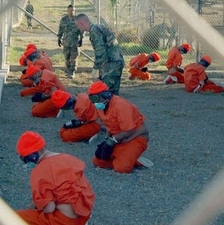
Huzaifa Parhat, a fruit peddler, has been imprisoned at Guantánamo Bay Detention Center for the last seven years. He is not a terrorist. He's a mistake, a victim of the war against al Qaeda. An interrogator first told him that the military knew he was not a threat to the United States in 2002. Parhat hoped he would soon be free, reunited with his wife and son in China. Again, in 2003, his captors told him he was innocent. Parhat and 16 other Uighurs, a Muslim ethnic minority group, were living in a camp west of the Chinese border in Afghanistan when the U.S. bombing campaign against the Taliban destroyed the village where they were staying. They fled to Pakistan, but were picked up by bounty hunters to whom the U.S. government had offered $5,000 a head for al Qaeda fighters.
The Uighurs were officially cleared for release in 2004, but they remain at Guantánamo. They cannot be repatriated to China, because they might be tortured, and no other country will take them. The U.S. government does not want to allow them into the United States for fear of setting a precedent that might open the door for detainees it still considers dangerous. In 2006, after again being told that they were innocent, and becoming desperate, some of the Uighurs began mouthing off to their captors. They were sent for a time to Camp Six, a $30-million "supermax" prison for holding al Qaeda suspects in isolated cells.
In the tomb-like confines of this concrete prison, some of them began to crack up, says P. Sabin Willett '79, J.D. '83, a Boston-based attorney with Bingham McCutchen, the firm that has represented the Uighurs pro bono since 2005. "The Department of Defense has studied what happens to human beings when they are left alone in spaces like this for a long time and it is grim," Willett notes. "The North Koreans did this to our airmen in the 1950s. The U.S. ambassador to the United Nations went to the floor of the General Assembly and denounced the practice as a step back to the jungle."
Continue reading The War and the Writ: Habeus Corpus and Security in an Age of Terrorism.

